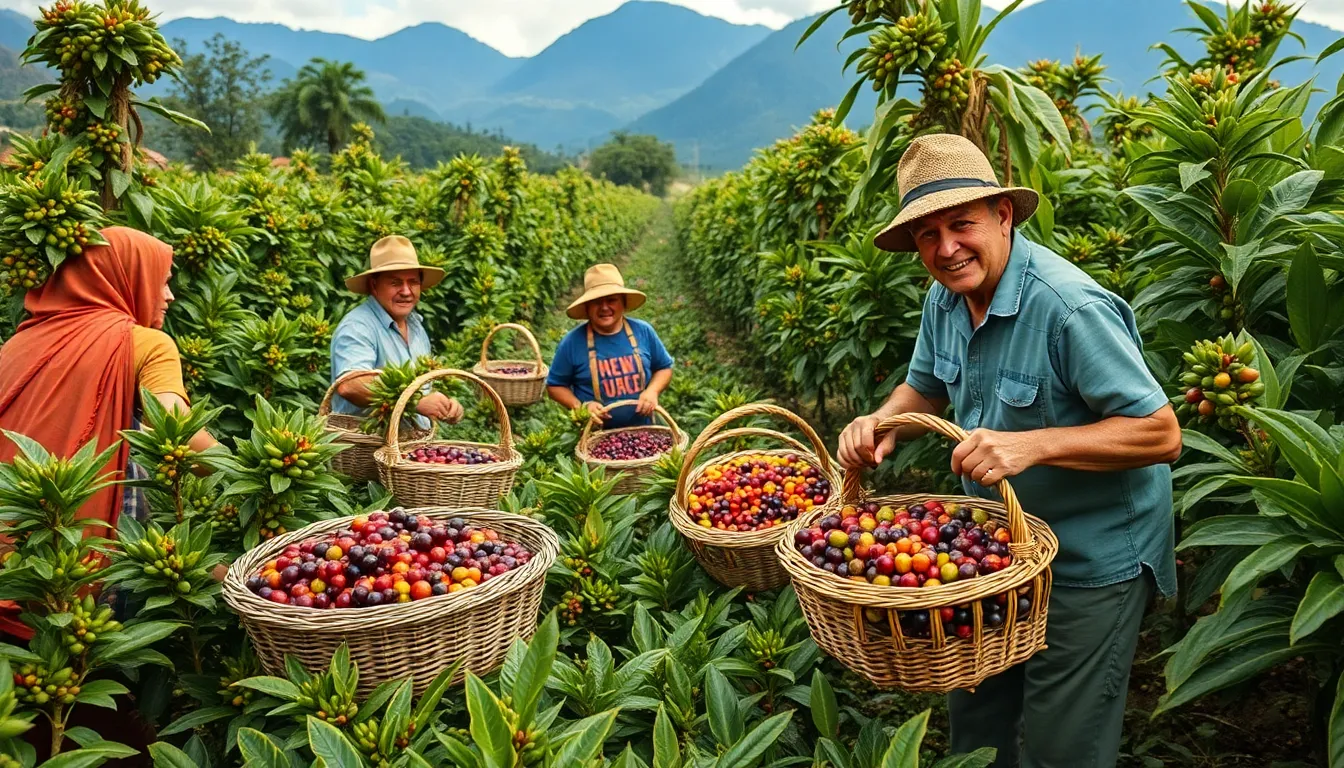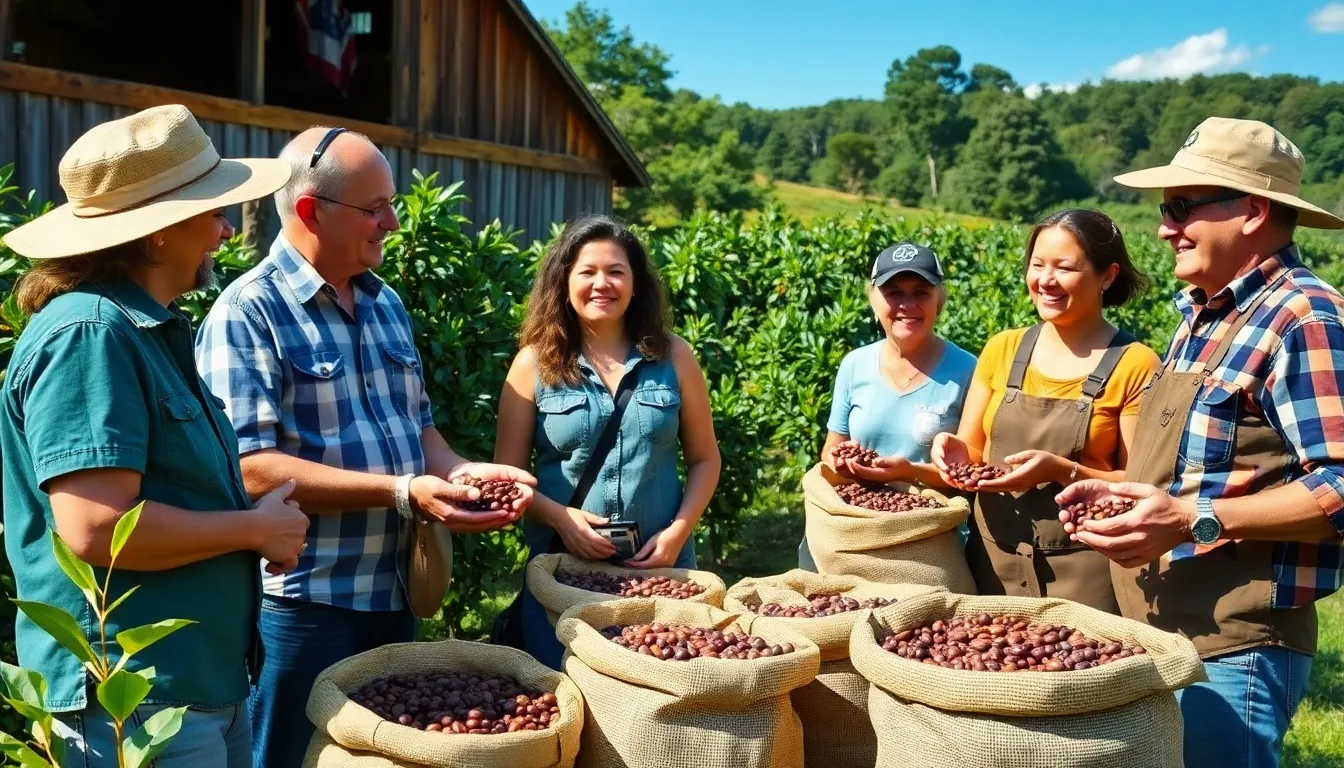In a world where coffee is the lifeblood of morning routines, local coffee producers are the unsung heroes brewing up magic in every cup. They’re not just pouring caffeine; they’re crafting experiences that tickle taste buds and warm hearts. Imagine sipping on a rich, aromatic blend that’s as fresh as your neighbor’s garden tomatoes—now that’s a morning upgrade!
Table of Contents
ToggleOverview of Local Coffee Producers
Local coffee producers play a significant role in the coffee industry. They cultivate beans with care, ensuring high quality from the start. Regions known for their unique climates contribute to the flavor profiles of the coffee. Dedicated farmers often use sustainable practices, promoting environmental health.
Many local roasters emphasize small-batch roasting techniques. These methods enhance the distinct characteristics of each coffee variety. Producers select beans based on origin and flavor notes, creating blends that appeal to diverse palates. Local shops, in turn, showcase these artisanal creations, fostering a strong community connection.
Coffee enthusiasts often find joy in exploring local offerings. Markets frequently highlight these producers, providing opportunities for sampling. Events such as tastings invite consumers to engage with the process and learn about sourcing and roasting. Education about the origin of beans adds depth to the coffee experience, creating informed drinkers.
Sourcing from local producers strengthens economies. It fosters relationships between farmers and consumers, developing a sense of trust. Community support shapes the growth of these producers, leading to increased investment in quality and sustainability. Trends indicate a rising demand for locally sourced products, with consumers valuing both craftsmanship and ethical considerations.
Ultimately, local coffee producers do more than supply caffeine; they enhance the culture surrounding coffee. They provide a personalized touch, creating memorable experiences with every cup poured. With a focus on quality and connection, these producers remain essential to the thriving coffee landscape.
Importance of Supporting Local Coffee Producers


Supporting local coffee producers strengthens community ties and enriches the coffee experience. Increased patronage highlights the importance of local craftsmanship and sustainability.
Economic Benefits
Local coffee producers contribute significantly to the economy. They create jobs in farming, roasting, and retail, providing steady employment for residents. Small businesses boost local economies, generating income that circulates within communities. Additionally, producers often source their materials locally, creating partnerships with other regional suppliers. This interconnectedness fosters economic growth, benefiting everyone involved.
Environmental Impact
Local coffee producers often prioritize sustainable practices. They utilize organic farming methods that preserve soil health and reduce chemical use. Many embrace shade-grown coffee cultivation, which protects biodiversity and promotes wildlife habitats. Engaging in environmentally friendly practices minimizes their carbon footprint, contributing to healthier ecosystems. Consumers play a role by choosing products that reflect these values, encouraging more producers to adopt sustainable methods. Local coffee also reduces transportation emissions, aligning with eco-conscious choices for many shoppers.
Highlighting Notable Local Coffee Producers
Local coffee producers play a crucial role in the coffee landscape, enhancing the overall experience with their artisanal offerings. They cultivate relationships with their communities, creating a rich tapestry of flavors and stories.
Producer Profiles
Notable local coffee producers like Blue Mountain Coffee and Stumptown Coffee Roasters exemplify quality craftsmanship. Blue Mountain Coffee thrives in Jamaica’s mountainous terrain, renowned for its smooth and mild flavor. Stumptown, based in Portland, Oregon, sources high-quality beans directly from farmers, emphasizing transparency. Each producer’s unique story adds depth to their offerings, contributing significantly to local culture. These producers commit to sustainable practices, fostering community support and economic growth.
Unique Offerings and Specialties
Distinctive blends and unique roasts define the offerings of local coffee producers. Many specialize in single-origin coffees, allowing consumers to explore diverse flavor profiles. For instance, certain roasters may focus on fruity notes from Ethiopian beans, while others highlight the chocolate undertones of Colombian varieties. Specialty drinks, including cold brews and nitro coffees, enhance the coffee experience. Seasonal offerings often feature local ingredients, enhancing connections between the coffee and the community. These unique products not only provide delightful tastes but also encourage exploration and appreciation of local craftsmanship.
Challenges Faced by Local Coffee Producers
Local coffee producers encounter various challenges that impact their operations and growth potential. Understanding these obstacles helps in appreciating their contributions to the coffee culture.
Market Competition
Intense market competition poses a significant challenge for local coffee producers. They often compete against large, established brands with greater resources for marketing and distribution. Unique offerings can help differentiate them, but gaining visibility in a crowded market remains difficult. Local shops must innovate continually, introducing exclusive blends or limited-time seasonal offerings to attract customers. Building loyalty among coffee enthusiasts requires time and dedication. Despite these hurdles, many local producers thrive by leveraging connections with their communities and emphasizing the value of artisanal craftsmanship.
Sustainability Issues
Sustainability issues also weigh heavily on local coffee producers. Organic farming practices promote environmental health, yet they come at a higher cost and may reduce profit margins. Access to resources for sustainable technologies can be limited, restricting their ability to implement eco-friendly solutions. Additionally, unpredictable climate conditions threaten crop yields and quality. Producers often struggle to balance profitability with their commitment to the environment and fair labor practices. Many seek grants and partnerships to enhance sustainable practices, ensuring their coffee remains both delicious and ethically sourced while maintaining community support.
Local coffee producers play an essential role in shaping the coffee landscape. Their commitment to quality and sustainability not only enriches the coffee experience but also strengthens community bonds. By sourcing ingredients locally and employing environmentally friendly practices, these producers contribute to healthier ecosystems and support local economies.
As consumers increasingly seek unique flavors and authentic experiences, the importance of local coffee producers grows. They invite coffee lovers to explore diverse profiles while fostering a sense of belonging within the community. Supporting these artisans is a step toward a more sustainable and connected future, ensuring that every cup of coffee tells a story worth savoring.
